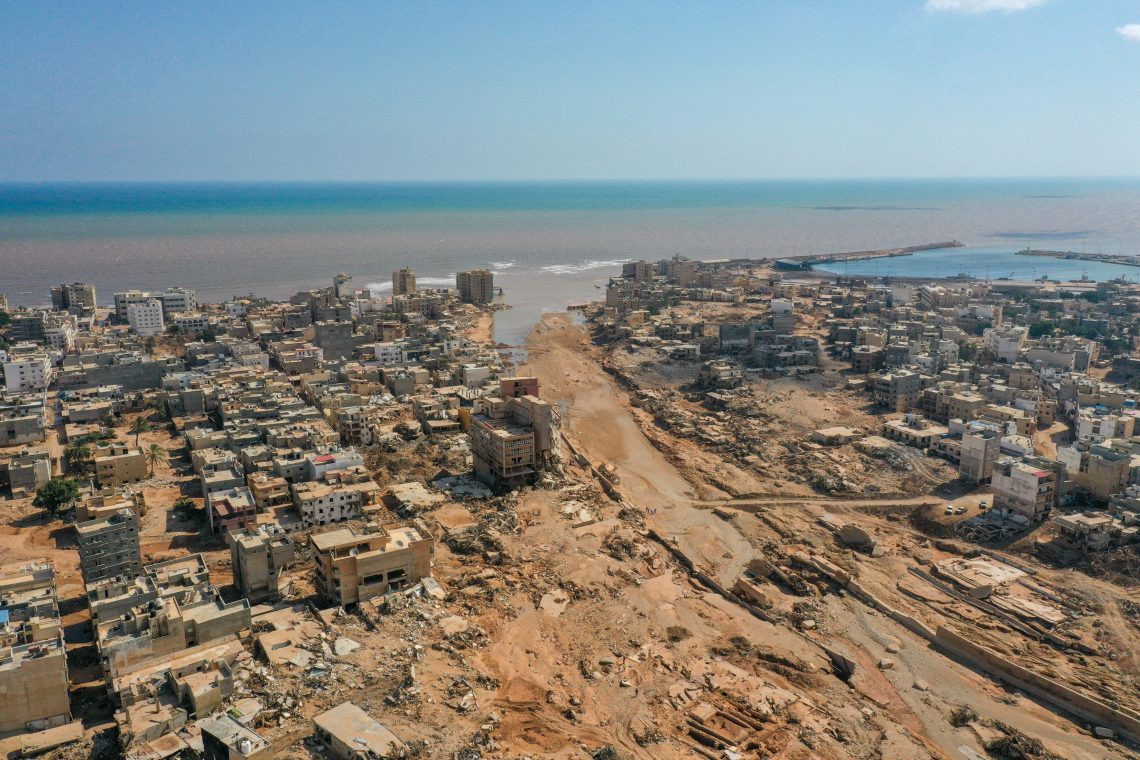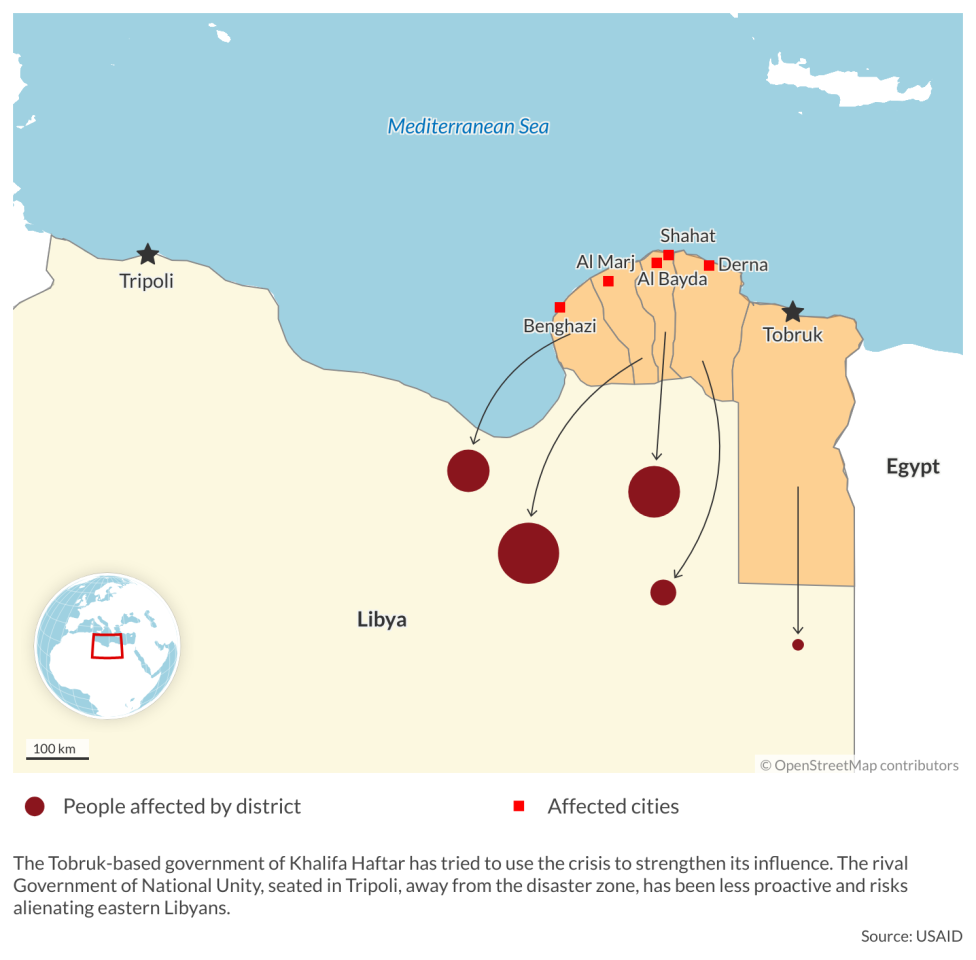Libya’s future after the Derna dam disaster
Corruption and chaos will thwart international efforts to support post-disaster Libya, while Russia and China are taking the opportunity to create a larger foothold.

In a nutshell
- Years of neglect in eastern Libya led to unprecedented damage
- The crisis highlights political divisions between the country’s rival governments
- Aid efforts will be stymied by deep-seated corruption and poor institutions
On the night of September 10-11, 2023, the tropical-like cyclone Daniel abruptly changed course after making landfall near Benghazi, Libya, and unleashed catastrophic rains onto the country’s northeastern coast. The storm collapsed two key dams, and the resulting floodwaters partially destroyed the city of Derna – submerging coastal neighborhoods, sweeping away bridges and buildings and dragging people and vehicles into the sea. Within a week, estimates for the number of casualties ranged from 5,300 to 20,000, as confirmed by Derna Mayor Abdulmenam Al-Ghaithi. Thousands more are still missing or displaced.
The disaster was attributed to decades of neglect of the region during and following the rule of Muammar Qaddafi, who acted ruthlessly toward the local population and was uninterested in maintaining the Derna and Mansour Dams. The city was also a battleground during the Libyan Civil War and under Islamic State rule, possibly further undermining the two dams, which were built in the 1970s to control flooding, irrigate agricultural lands and provide water to nearby communities. The flood has been described as the second-deadliest dam failure in history, after the 1975 Banqiao Dam incident in China, when a massive typhoon caused the collapse of 62 dams, killing between 26,000 and 240,000 people.
Aid efforts
The current situation in Derna is still very critical. The Libyan Red Crescent, the United Nations, the European Union, Turkey, Egypt and other countries have sent humanitarian assistance, including food, water, medicine, tents and blankets. The city’s infrastructure has been severely damaged, as the floodwaters destroyed two dams, four bridges, roads, buildings, power lines and water pipes.
At first, there was a great effort by Libyans to alleviate the suffering of the citizens of Derna, such as the work of the non-governmental organization Tamnia360, a promising example of what today’s younger generation in Libya can achieve. Later, when the international community became distracted by other crises, the first signs of discontent began to appear between the country’s two competing governments.
The disaster has exposed political and social divisions in Libya, with the eastern-based House of Representatives (HoR) government and the western-based Government of National Unity (GNU) each blaming the other for the negligence and corruption that led to the dam failures. Derna has been a hotspot of conflict and violence for years, as it was a stronghold of anti-Qaddafi rebels, Islamist militants and Islamic State fighters – and the scene of intense fighting by Libyan National Army troops under the command of Field Marshal Khalifa Haftar and his sons. Mr. Haftar’s forces, in fact, captured Derna in 2019, after a long siege and a campaign of violence against the local population.
Read more by Federica Saini Fasanotti
The chimera of elections in Libya
In May 2021, the GNU, with a budget of 1.5 billion dinars (about $334 million), established the Benghazi and Derna Reconstruction Fund to rebuild and restore the areas damaged by war and floods in the eastern Libyan cities of Benghazi and Derna. Another goal is to provide humanitarian assistance and social services to the affected populations, and to support the economic recovery and development of the region. Based in Benghazi and operating under the supervision of the Council of Ministers, it is funded from the government budget, foreign exchange fees and the contributions of the private sector and international donors. The fund works in coordination with local authorities, the United Nations Development Program (UNDP) and other partners to implement its projects and programs.
In parallel, at the end of September, the HoR decided to allocate 10 billion dinars (around $2.05 billion) for Derna and its environs. In early November, the HoR held a two-day International Conference for the Reconstruction of Derna and the affected cities, citing the attendance of more than 162 Arab and international companies from 26 countries (including the U.S., the UK, France, Portugal, Romania, Bulgaria, Belarus, China, Russia, Turkey, the UAE, Tunisia, Jordan and Egypt).
Blame game
The eastern-based HoR prime minister, Osama Hammad, declared that reconstruction would be the first priority, which he hoped to achieve through both national and international partnerships. National collaboration is a key element, as since 2014 there has never been a real agreement between Libya’s political parties: there have been a lot of words, mostly to attract foreign funds, but no real expression of joint national interest of any kind to set aside the petty claims of Libyan leaders. Abdoulaye Bathily, the UN Special Representative for Libya, strongly suggested that more cooperation was a goal, calling for an “agreement on a unified and coordinated Libyan national mechanism to direct the recovery and reconstruction efforts and to ensure transparency and accountability.”
Mr. Haftar arrived in Derna on September 15 to follow up on rescue operations and show concern for the victims. His youngest son, Brigadier General Saddam Haftar, was given the task of overseeing the rescue efforts and coordinating aid delivery from various sources, including the rival government in Tripoli. However, some observers have questioned his sincerity and motives, accusing him of using the disaster to consolidate his power and influence in eastern Libya. Instead of cooperating with Tripoli, the younger Haftar has charged the GNU with neglecting Derna.
Facts & figures
The international community is taking action to try to speed up the reconstruction of the city, but the process will still take years. The UN and its agencies, including the UN Development Program, the UN Refugee Agency, the World Health Organization and the World Food Programme, have launched a humanitarian appeal to provide emergency relief and recovery assistance to those affected. They have also deployed teams to assess the damage and coordinate the response.
The EU and its member states are said to be ready to release 5.2 million euros in humanitarian funding, and the U.S. and allies like the UK, Canada and Australia have made similar pledges. The same is true of Turkey and Qatar (the main supporters of the GNU) and the United Arab Emirates and Egypt – the main backers of Gen. Haftar, who seems to be the only real winner at the moment.
Instead of losing control of the situation, Mr. Haftar has strengthened his grip on power while freeing himself from responsibility, blaming figures in both the local administration and the GNU in Tripoli. That rival regime, on the other hand, appears – in part because of its obvious remoteness from Derna – to be far less active, risking further alienation from the people of the eastern Cyrenaica region.
Scenarios
In a country where corruption reigns and where politicians have little love for their homeland, it is likely that funds will arrive only to partly disappear. A massive urban reconstruction necessarily requires great coordination and unity of purpose – two elements that are totally lacking now in Libya.
Furthermore, as the West prepares to lavish large sums of money on Libya, it is likely that other countries, especially China and Russia, will become even more entrenched in the territory through urban investments or the presence of paramilitary contractors that can lengthen the survival of Mr. Haftar and his allies. There are already unconfirmed reports of a growing Russian presence on the ground pushing for the Haftar regime to sign contracts for air technical supplies and pilot trainers in exchange for opening ports, a possibility raised years ago. If so, one more problem would be added to those Europe already faces in Libya.
For industry-specific scenarios and bespoke geopolitical intelligence, contact us and we will provide you with more information about our advisory services.










